
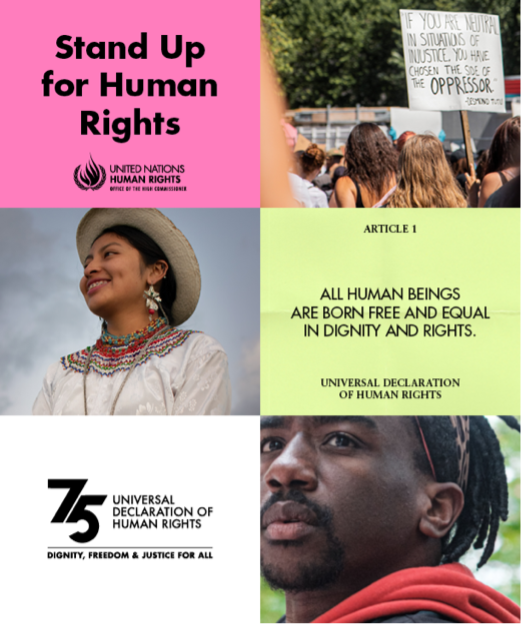
Editor’s Note
The focus in this month’s Bulletin is on Human Rights Day, celebrated each year on December 10
Table of Contents
Special Focus: Human Rights Day
- Editor’s choice: Statement s in Honor of Human Rights Day
- Collective Reading of the Universal Declaration of Human RIghts (video)
- GNPHR opinon piece/blog: Promoting Dignity, Freedom, and Justice for All in an Era of Uncertainty
- GNPHR video: What do human rights mean to you?
- GNPHR Network of Human Rights Committees in Psychology Organizations
- Webinar Series
SPECIAL SECTION
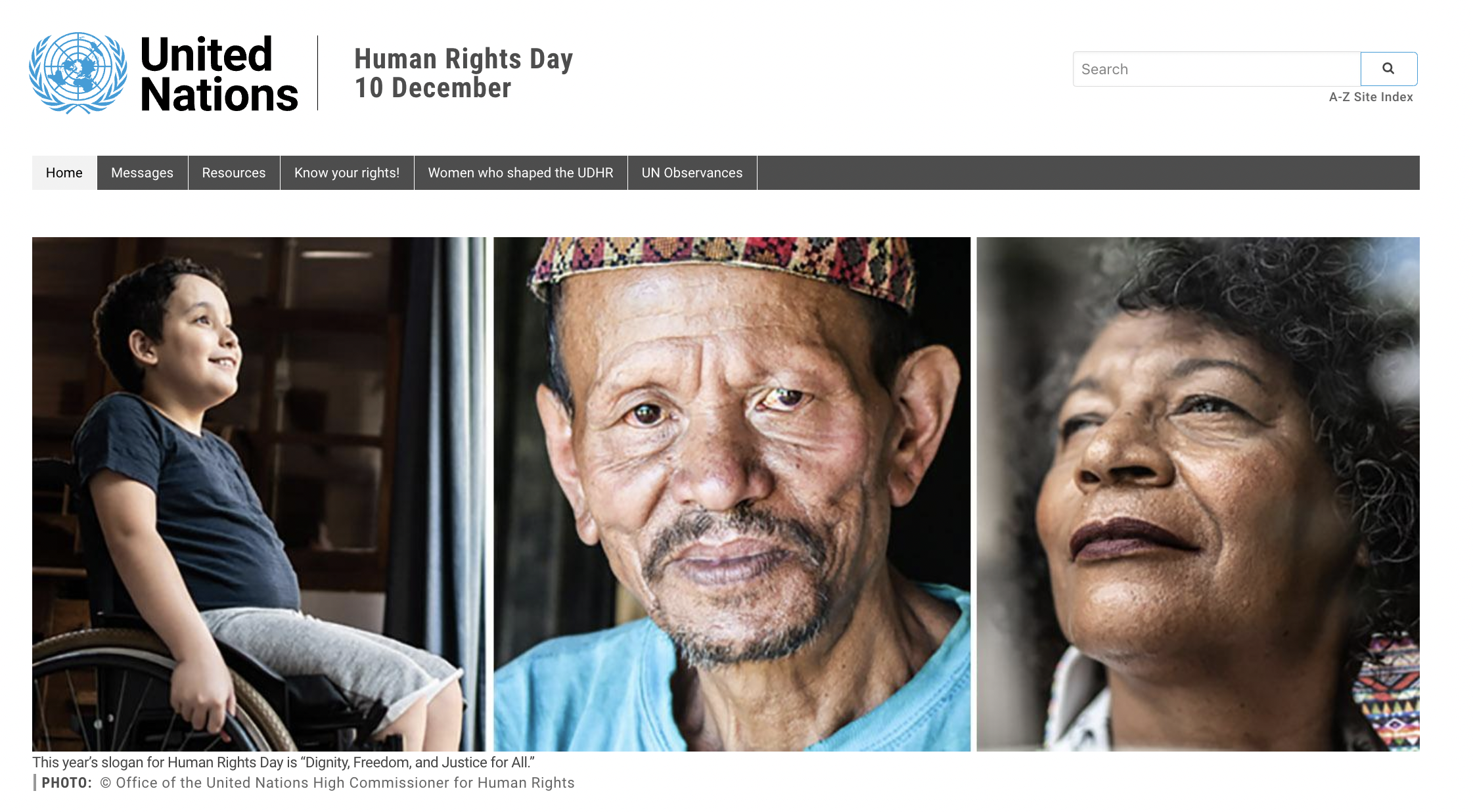
Editor’s Choice: Statements in Honor of Human Rights Day
On Human Rights Day, 2022, the United Nations launches a year-long campaign
The UDHR consists of a preamble and 30 articles that set out a broad range of fundamental human rights and freedoms to which all of us, everywhere around the world, are entitled. It guarantees our rights without distinction of nationality, place of residence, gender, national or ethnic origin, religion, language, or any other status.
[from the UN Office of Human Rights] The 75th anniversary of the Universal Declaration of Human Rights will be celebrated on 10 December 2023. Ahead of this milestone celebration, starting on this year’s Human Rights Day on 10 December 2022, we will launch a year-long campaign to showcase the UDHR by focusing on its legacy, relevance and activism.
2022 Theme: Dignity, Freedom, and Justice for All
“Join us [the UNOHRC] for a year-long campaign to promote and recognise the 75th anniversary of the Universal Declaration of Human Rights, that will be celebrated on 10 December 2023.
In the decades since the adoption of the Universal Declaration of Human Rights in 1948, human rights have become more recognised and more guaranteed across the globe. It has since served as the foundation for an expanding system of human rights protection that today focuses also on vulnerable groups such as persons with disabilities, indigenous peoples and migrants.
However, the promise of the UDHR, of dignity and equality in rights, has been under a sustained assault in recent years. As the world faces challenges new and ongoing – pandemics, conflicts, exploding inequalities, morally bankrupt global financial system, racism, climate change – the values, and rights enshrined in the UDHR provide guideposts for our collective actions that do not leave anyone behind.”
“The year-long campaign seeks to shift the needle of understanding and action towards greater knowledge of the universality of the UDHR and the activism associated with it.”
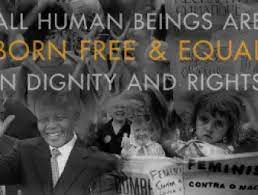 Collective Reading of the Universal Declaration of Human Rights
Collective Reading of the Universal Declaration of Human Rights
(read at the International Council of Psychologists’ 80th annual meeting, December 11, 2022) See the video here

GNPHR Blog – in honor of the International Day of Human Rights
The GNPHR published an opinion piece/blog by Dr. Roseanne Flores titled Promoting Dignity, Freedom, and Justice for All in an Era of Uncertainty. Dr. Flores is professor of Psychology at the City University of New York in the United States and an NGO representative to the Economic and Social Council of the United Nations.
GNPHR NEWS AND EVENTS
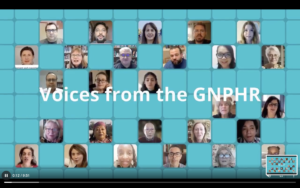 What do Human Rights Mean to You?
What do Human Rights Mean to You?
The Global Network produced a collective video, with GNPHR members completing the sentence: ‘To me, human rights mean …’. See it here
And now, you can join in, ask your friends, family and neighbors, to post a new video with a global, societal voice. Go here to record your answer or to invite others.
Psychology Organizations and Human Rights
The Network of Human Rights Groups in Psychology Associations is open to representatives of psychology associations that have established a committee, office, or subgroup focused on psychology and human rights. If you are interested in joining the group please register your interest here https://humanrightspsychology.org/home/about/interest-form-gnphr-working-group/
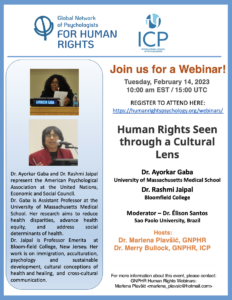 GNPHR Webinar Series – Human Rights and Psychology
GNPHR Webinar Series – Human Rights and Psychology
Next Webinar is February 14, 2023, 4 pm CET
Topic: Human Rights Seen Through a Cultural Lens
View all webinars in series here https://humanrightspsychology.org/webinarseries
CONTENT AREAS AND NEWS
General
National Association of Psychologists in Ukraine issued a call for donation support for a national hotline staffed by psychologists: https://en.npa-ua.org/donate?utm_medium=email. According to the call, “the hotline operates on a single number available from Ukraine 0-800-100-102 from 10:00 to 20:00. All calls are free. In order to receive a video consultation with a psychologist, client needs to notify the operator and he/she will switch the application to video conferencing. Psychologists-consultants of the line are specially educated specialists who are trained in providing crisis interventions, trauma-informed approach, topics of violence. All consultations are confidential. If necessary, line psychologists can refer people to other specialists.” The NPAU website also lists toll free help numbers for Ukrainians around the world.
Children/Youth
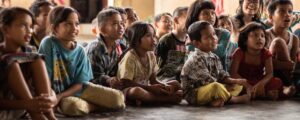
Opinion Piece (Blog) by Simangele Mayisela, Reflecting on children’s rights and nurturing care on World’s Children’s Day. Dr Simangele Mayisela, is a Senior Lecturer and Educational Psychologist in the Department of Psychology, University of the Witwatersrand, Johannesburg, South Africa
Climate Justice
Opinion piece on Climate and the Amazon, by Derek Indoe, GNPHR Advisory Committee
‘It’s too far away’. ‘It’s not my problem’. ‘Where, did you say?’ ‘Cognitive dissonance’. ‘But I just love my burger and chips’. These are just some of the justifications used in climate change denial. And ok religion is not everyone’s bag. But standing up for justice and peace are central the Universal Declaration of Human Rights. The despicable defence of the Ukrainian war by the Patriarch of Moscow is as shameful as the reasoning of those religious, who defended the massacre of the 2000 tribes or 11 million Indigenous people that were in Brazil, when the Portugese arrived. Some 90 per cent were slaughtered or died through flu, measles and smallpox brought to them by Europeans along with slavery on the rubber and sugar plantations. Just as the film ‘the Mission’ portrays the Jesuits who defended the indigenous of Brazil all that time ago, so too does a modern-day leader in Brazil. As stated, justice, peace and the intrinsic uniqueness and value of every human being are everyone’s concerns, and at the heart of decolonising psychology. So too is action, both individual and group action. So read this text and ask yourself what can you do to make others aware so that individuals, (especially politicians), groups, and communities stand up, and support the defenders of the defenders of the Amazon forest.
Decolonization / Indigenization
Archbishop of the diocese of Porto Velho, Brazil is threatened for defending indigenous rights
[translation from Portuguese in “Gente de Opināo”]
29 de novembro, Por Resenha Política, Gente de Opinião The archbishop of the diocese of Porto Velho, [Brazio] Dom Roque Paloschi, is being threatened for defending indigenous rights and denouncing the advance of environmental degradation, [according to an article on the Uol website-omit?]. Dom Roque is president of Cimi (Missionary Indigenous Council) and is a loud voice against violence against native communities and in the Amazon biomes. Since he took over the archdiocese of the capital of Rondônia, last September, accompanied by leaders of the Karipuna peoples, he has been to several embassies of countries in the federal capital when he denounced invasions of indigenous territories in Rondônia by loggers and miners. The denunciations made earned him threats, including during celebrations at his masses.
SURVIVAL: They (Indians) have the right to enjoy their territories which, according to Dom Roque, are being decimated by illegal exploitation, even in lands that have already been demarcated. “More and more this violence is being fed back by the greed of the economy of death”, according to the statements given to the website. Rondônia is a state that has registered an unbridled increase in environmental depredation and, as the soy culture advances, the forests are the main victims, mainly in reserves and conservation units. For their survival, the ethnic groups of the native peoples of Rondônia have the support of environmentalists and religious people, since the state protection agencies turn a blind eye to the invaders.
BACKGROUND: Rondônia has in its history antecedents of violence against religious people when they took the life of Father Ezequiel Ramin, in Cacoal, in the eighties. Therefore, it is necessary to vehemently denounce the threats suffered by Dom Roque to prevent a new religious from falling on Rondonian soil due to missionary work. This work requires denouncing violent criminals with the original communities and the environment.
Human Rights Education
The University of new Europe https://neweurope.university/ is an academic institution in the making which will offer research, teaching, and dialogue on European politics, culture, society and climate in a global perspective. In response to Russia’s war in Ukraine, its initiators are also engaged in supporting scholars, students, and cultural workers at risk with a mentoring network.
What it does now: hosts a database with emergency resources worldwide for scholars, students, and cultural workers at risk; curates a book series titled ‘New Europes’; and organizes the UNE mentoring programme for students, scholars, and cultural workers affected by the war in Ukraine or at risk of political persecution in Belarus and Russia.
Inclusion, Exclusion, Racism
American society is so focused on race that it is blind to class. The end of affirmative action in college admissions could be a chance to build a better system. 2 November 2022, The Economist.
Racism poses public health threat to millions worldwide, finds report.
Andrew Gregory, 8 December 2022, The Guardian.
Discrimination has ‘profound’ effect on health of disadvantaged people, says Lancet review. The review calls for wider recognition of xenophobia as a fundamental determinant of health.
Racism is a “profound” and “insidious” driver of health inequalities worldwide and poses a public health threat to millions of people, according to a global review.
Racism, xenophobia and discrimination are “fundamental influences” on health globally but have been overlooked by health researchers, policymakers and practitioners, the series published in the Lancet suggests. Inaccurate and unfounded assumptions about genetic differences between races also continue to shape health outcomes through research, policy and practice, the review of evidence and studies found.
“Racism and xenophobia exist in every modern society and have profound effects on the health of disadvantaged people,” said the lead author, Prof Delan Devakumar of University College London. “Until racism and xenophobia are universally recognised as significant drivers of determinants of health, the root causes of discrimination will remain in the shadows and continue to cause and exacerbate health inequities.”
The Lancet series argues that discrimination is a significant driver of racial health inequities and outlines the ways in which it harms health – including directly affecting the body via stress responses, profoundly shaping living environments and limiting individuals’ opportunities to improve health. The authors call for wider recognition of racism and xenophobia as fundamental determinants of health and for the implementation of measures that focus on the structural causes.
The Guardian has exposed the consequences of these political and social drivers in a series of stories focusing on major health disparities.
In August, it was revealed that black and Asian people in England have to wait longer for a cancer diagnosis than white people, with some forced to wait an extra six weeks.
The analysis of NHS waiting times and the world’s largest primary care database by the University of Exeter and the Guardian discovered minority ethnic patients wait longer than white patients in six of seven cancers studied. Race leaders called the results “deeply concerning” and “absolutely unacceptable”.
In the series from the Lancet, the authors also outline how medicine has historically shaped and supported the categorisation of humans that have led to modern-day social hierarchies.
LGBTQI+, Gender Rights
Anti-LGBT law in Russia: ‘Leaders want to construct a united conservative base’. Lou Roméo, 26 November 2022, France 24.
“Russian MPs this week updated, and expanded, an anti-LGBT law – the latest in a series of measures aiming to highlight “traditional” family values. Against a backdrop of conflict in Ukraine, Russian political and religious leaders are ramping up an internal identity war.
Russian MPs on Thursday voted to extend a law banning all forms of LGBT “propaganda”. When it was first introduced in 2013 the law purported to prevent minors from seeing content that framed LGBT relationships in a positive light. Nine years later it has been expanded to include adults, forbidding “the promotion of non-traditional sexual relations” in all media, books, films and online.
This is the latest move in a shift towards conservatism from Russian authorities that dates back to the early 2000s. At the heart of messaging from the Kremlin is the defence of so-called traditional Russian values against “harmful” Western influence. “
Mental Health and Human Rights
Political abuse of Iranian psychiatry and psychiatric services. Maryam Jay, Artin A Mahdanian, Emytis, Tavakoli, Dainius Puras, The Lancet, November 24, 2022.
Statement from psychiatrists: “For months the world has witnessed how the people of Iran dare to protest against their ruling regime for the extensive violation of human rights and multiple other social, economic, and political issues affecting their daily lives. Independent media reports claim that more than 300 people, including at least 40 children, have been killed by the regime’s military and paramilitary forces.
“Primary school and high school students have joined these protests, asking for freedom of choice. The Minister of Education of Iran admitted in a state media interview that the school-age students who are arrested in the protests are sent to psychological centres, claiming that “it is possible these students have become ‘anti-social characters’ and we want to reform them”.
“As a group of psychiatrists, we strongly condemn the use of psychiatric and psychological services as a corrective measure in political conflicts. This approach leads to arbitrary psychiatric confinement, especially in a country that has no mental health laws. Such practices are clear violations of human rights and are concerning for many other reasons, including wrongly pathologising opinions and values that differ from that of a ruling regime.
Such drastic measures would lead to stigmatising young people by labelling them as having mental health conditions. Psychiatry must never be used as a social control, oppressive, or punitive measure.
“The belief that coercive psychiatric measures can be used to correct young adults with differing personal, social, cultural, religious, or political views to align them with the propaganda of ruling regimes has long been outdated.
“Political abuse of psychiatry is not a new phenomenon. The former Soviet Union, Russia, Cuba, and China—among other countries—have a history of abusing psychiatry for political reasons.
Migration, Refugees, Displacement, Statelessness
Europe’s Black Sites. December 8, 2022, Lighthouse Reports.
How refugees are being arbitrarily detained and tortured at secret facilities along EU borders before being illegally forced back across borders.
Despite government denials and technical arguments, the campaign of illegal pushbacks at Europe’s borders has been repeatedly shown by Lighthouse Reports and other investigative journalists to be real. And yet it continues regardless.
The full extent of the human cost and the damage to the rule of law that this campaign inflicts is still being uncovered. Hundreds of witnesses have testified to the existence of “black sites” – clandestine detention centres – where refugees and migrants are denied the right to seek asylum and held prior to being forced back.
Lighthouse Reports and partners can reveal that security forces along EU borders – specifically in Bulgaria, Hungary and Croatia – are using secret facilities to systematically detain people seeking refuge before illegally deporting them, in what has been denounced as a clear violation of international law.
We have obtained visual evidence that refugees have been held in a derelict, cage-like structure in Bulgaria, sometimes for days at a time, held for hours in overcrowded and dangerously hot vans in Croatia, and held in containers and at an isolated petrol station in Hungary. Because they operate outside of formal detention or reception systems, they are excluded from independent scrutiny or public access. The existence of these sites has long been rumoured, there was no visual evidence or location data until now. During the last 11 months, we have gathered footage and collected testimonies from people who have been held in them.
Our investigation demonstrates that these are not isolated sites, rather they are part of a system – some of which is funded by the EU and operated in plain sight of officers from Frontex, the EU border agency.
Violence and War / Peace
Podcast ‘Our responsibility in the face of war’, Elison Santós, Spotify, 59 min. Global Psychology, 24 April 2022. An inspiring conversation with a colleague from Ukraine who asked not to be identified. In times like these, we are called to ask ourselves what our role is in history, what is our responsibility in the face of what is happening in the world.
Women
 UN Women statement on International Women Human Rights Defenders Day, 29 November 2022
UN Women statement on International Women Human Rights Defenders Day, 29 November 2022
The bravery and courage of women in situations such as those in Afghanistan and Iran, asserting and calling for their human rights in the face of seemingly insurmountable adversity, continues to inspire us. In these countries and others, women in all their diversity continue to prove that the quest for the recognition of human rights is universal, untiring and unstoppable.
International Women Human Rights Defenders Day is an occasion to celebrate and thank those women and girls who tirelessly advocate for human rights, and people of all genders who defend women’s rights and rights related to gender equality. Around the world, women human rights defenders give of themselves to bring about a future in which all persons enjoy the dividends of equality and the fullest range of rights.
The situation for women and girls in Afghanistan has become worse and worse, Letter by Deborah A. Stiles, Ph.D., November 10, 2022 .
Two-thirds of Afghans are going hungry, with girls’ education subject to “random edicts” of the Taliban, while crime and terrorism are thriving once more buoyed by a large spike in opium production, warned the President of the UN General Assembly on Thursday.
The Right to Education (Article 26 of the UDHR) in The Universal Declaration of Human Rights, Article 26 states that everyone has the right to education. As women in Afghanistan are under restrictions from both attending or teaching education, their basic human right to education is under danger.
Current Events: As of late September, the Taliban Islamic Emirate government continues to systematically remove women from public spaces, just over a month since the overtaking of the Capital of Kabul. https://www.euronews.com/2021/09/18/taliban-reopens-schools-in-afghanistan-for-boys-only-and-repurposes-women-s-affairs-minist
While the initial responses from the Taliban suggested that it would not replicate the fundamentalist policies of the previous Taliban government, the current actions being carried out in Afghanistan suggest otherwise.
She spoke with Sarah (pseudonym), who is highly educated and in danger; she received an American university’s master’s degree in Forensic Accounting so that she could fight corruption. As a former Fulbright scholar, she had opportunities to leave by herself. She cannot leave her family behind; they could be harmed after she leaves.
Crime and terrorism thriving again in Afghanistan amid economic ruin, warns Kőrösi
10 November 2022 UN News. Two-thirds of Afghans are going hungry, with girls’ education subject to “random edicts” of the Taliban, while crime and terrorism are thriving once more buoyed by a large spike in opium production, warned the President of the UN General Assembly on Thursday.
PUBLICATIONS
Human Rights Violations in Latin America: Reparation and Rehabilitation (Peace Psychology Book Series),Elizabeth Lira, Marcela Cornejo, German Morales (Eds.), 2022, Springer
A timely contribution to the study of peace psychology in Latin America, this volume describes clinical, psychosocial, and community interventions with victims from Mexico to Chile from the 1970s onward. Chapters analyze how to conceptualize complex processes such as the appropriation of children and political repression, raising psychological, juridical, and political implications for the victims, their families, human rights organizations, and society. Also included are studies and analyses of political processes in countries currently undergoing crises such as Venezuela and Colombia and the challenges posed by the peace process from a political psychology perspective. All authors present the results of studies or clinical cases illustrating creative methodologies and practices in different contexts.
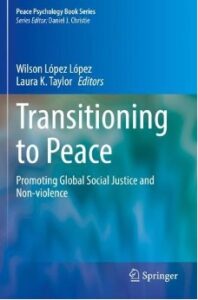 Transitioning to Peace: Promoting Global Social Justice and Non-violence – Peace Psychology Book Series, Wilson Lopez Lopez &Laura K. Taylor (Eds), 2021, Springer Nature.
Transitioning to Peace: Promoting Global Social Justice and Non-violence – Peace Psychology Book Series, Wilson Lopez Lopez &Laura K. Taylor (Eds), 2021, Springer Nature.
This edited volume highlights how individuals, communities and nations are addressing a history of protracted violence in the transition to peace. This path is not linear or straightforward. The volume integrates research from peace processes and practices spanning over 20 countries. Four thematic areas unite these contributions: formal transitional justice mechanisms, social movements and collective action, community-driven processes, and future-oriented initiatives focused on children and youth. Across these chapters, the volume offers critical insight, new methods, conceptual models, and valuable cross-cultural research. The chapters in this volume balance locally-situated realties of peace, as well as cross-cutting similarities across contexts.
This book will be of particular interest to those working for peace on the frontlines, as well as global policymakers aiming to learn from other cases. Academics in the fields of psychology, sociology, education, peace studies, communication, community development, youth studies, and behavioral economics may be particularly interested in this volume.
OPPORTUNITIES
Intersectionality of Care: Systems, Services, Industry
Picture Innovation for achieving gender equality and empowerment for all women and girls.
Date: Thursday, 15 December 2022 Time: 8 – 10 am EST
Panellists will include: Patricia Cortes, Coordinator for Global Alliance for Care, UN Women, and Sandra Massiah, Sub-regional Secretary for the Caribbean, Public Services International.
Register: https://us02web.zoom.us/meeting/register/tZ0kc-2sqjIuE90bYQzCH6Qm3t9iAc7QFVGD?utm_source=NGO+CSW%2FNY+Constituency&utm_campaign=4a1bbf3b12-Save+the+Date%3A+Sept+2020+Monthly+Meeting_COPY_01&utm_medium=email&utm_term=0_67ac6441ff-4a1bbf3b12-412218084&mc_cid=4a1bbf3b12&mc_eid=1250baaa87
EDRA 54 Mexico City
The Environmental Design Research Association (EDRA) invites practitioners, researchers, and educators from all interested fields, to submit proposals and join the 54th annual conference in Mexico City to collectively rethink how environmental, architectural, and design research can take on current challenges to improve the environment and promote well-being and health at both local and global level.
From Tuesday, June 20 to June 23, 2023, Universidad Nacional Autónoma de México.
Online registration is available until: 6/23/2023, EDRA54 Organizing Committee, conference@edra.org
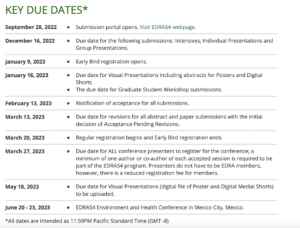
CONTACTS: Published by the Global Network of Psychologists for Human Rights – www.humanrightspsychology.org
Disclaimer: The website of the Global Network of Psychologists for Human Rights (GNPHR) contains articles, events and news about the domain where psychology and human rights intersect. The information presented in this Bulletin, does not imply that the GNPHR shares the views and beliefs in the articles.
- @GNPHR1
- How to get involved – read how you can contribute to the global network
- Consider contributing a Blog/Commentary
- News and Bulletins from the GNPHR – Subscribe to GNPHR
- Email addresses:
Ways to Participate in Global Network Activities
- Student/young person representation on the GNPHR Steering Committee
Are you a student or young person (under 35 years of age) interested in joining the GNPHR Steering Committee? The GNPHR invites applications. Role description: The terms of reference broadly define the roles of all members of the steering group. Individual steering committee member tasks include : Each member will take responsibility for one of the following: (a) A specific content area or group of areas; (b) A specific project (e.g. survey of human rights reporting mechanisms; survey of educational programs in psychology/human rights, etc); (c) A specific function: for example, organizing a newsletter; soliciting commentary or newsletter blogs; seeking grant possibilities; outreach to general human rights organizations; outreach to psychology organizations or (d) Consultation: Working in collaboration with other organisations where there is a specific issue. In addition, from time-to-time, short-term subgroups may work on specific projects. In addition, for the student member, there would be a specific remit to liaise with other organisations that are focussed on younger people, psychology and human rights. Click here if you are interested in being nominated. - Share Your Experiences and Examples
One of the best ways to illustrate the intersection of psychology and human rights is through example. We are looking for examples of your encounters with human rights issues in your professional life. You might describe a time when you protected (or failed to protect) human rights, or advocated for what you saw as a human rights issue. The events might be in your clinical, research, academic, applied, or volunteer work. Please send your narrative / story (500-1000 words) to Marlena Plavšić (marlena_plavsic@hotmail.com). We will compile these for publication in the GNPHR Bulletin and on the website. Please also indicate if you would like your stories to remain anonymous. - Share your Expertise and Opinions
We invite you to contribute a blog or opinion piece on general human rights issues; human rights education or strategies for raising the profile of human rights within psychology or your professional life. Students are welcome to contribute, including on student needs for learning about and addressing human rights. Please contact the GNPHR Blog editor (blogeditor@humanrightspsychology.org) with ideas for the article you would like to write! - Send articles/news/events
If you come across a human rights article or news, or know of an upcoming hunman rights event, please send for publication in the Bulletin. Send to the Bulletin editor Polli Hagenaars (polli.hagenaars@gmail.com).

